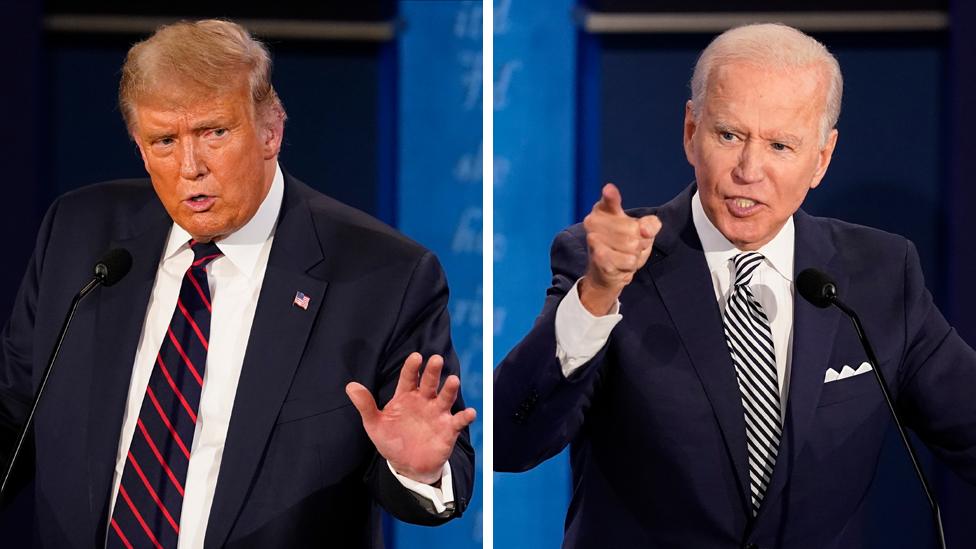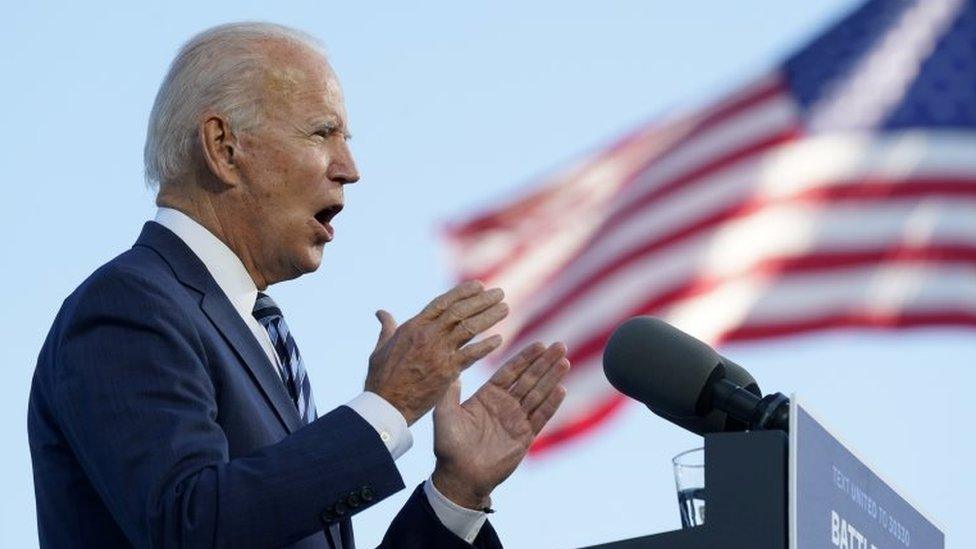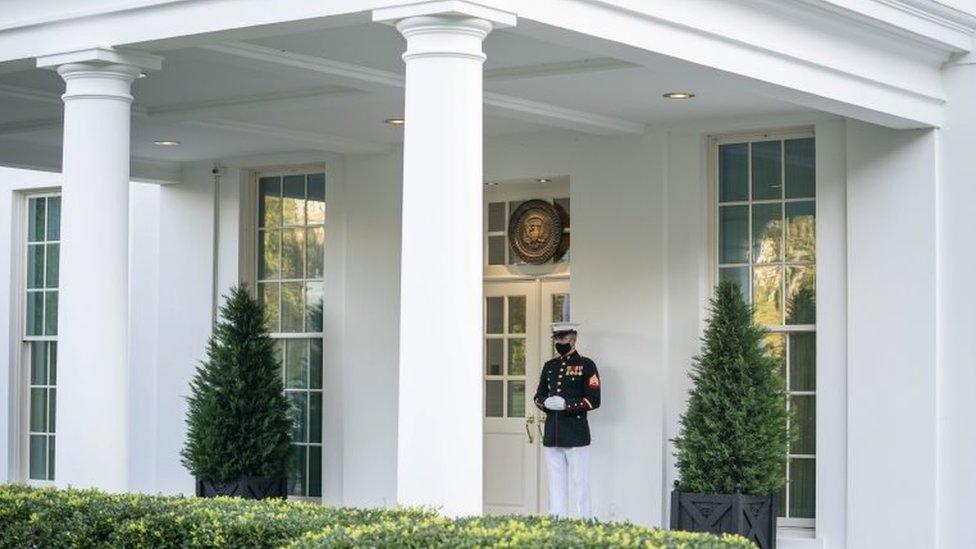Presidential debate: Trump refuses to take part in virtual TV event
- Published

The first debate descended into insults and interruptions
US President Donald Trump has refused to take part in a virtual TV debate with his Democratic rival Joe Biden.
The commission organising the debate in Miami on 15 October said it would have to take place remotely after Mr Trump tested positive for coronavirus.
Mr Trump's refusal sparked a day of wrangling about how and when any further debates would take place.
At the moment it appears a debate could take place on 22 October, although in what form remains to be seen.
The first presidential debate on 29 September had descended into insults and interruptions. The vice-presidential debate, held on Wednesday night between Mike Pence and Kamala Harris, was a far more measured affair.
The US election will be held on 3 November. Latest opinion polls suggest Mr Biden has a high single digit lead nationally, but the outcome is often decided in battleground states where the races can be much closer.
Six million votes have already been cast in early voting.
How did the row unfold?
It began with the Commission on Presidential Debates announcing candidates would take part in the Miami debate "from separate remote locations... to protect the health and safety of all involved".
Explaining the Electoral College and which voters will decide who wins
This infuriated the president who, in a phone-in interview with Fox Business Channel, said he was "not gonna waste my time" on a virtual debate and "sit behind a computer, ridiculous".
Joe Biden said the president "changed his mind every second" and his campaign team added that Mr Trump "clearly does not want to face questions from the voters".
The Trump campaign answered back, with manager Bill Stepien calling the commission's decision to "rush to Joe Biden's defence... pathetic" and saying Mr Trump would hold a rally instead on 15 October.
The Biden team then proposed the town-hall style debate, set for Miami, should go ahead on 22 October instead.
This brought a brief moment of agreement, on the date at least.

Joe Biden: "You never know what's going to come out of his mouth"
However, the Trump team said there should be a third face-to-face debate - on 29 October, just five days before polling.
No, said the Biden team. Three dates had been set for debates - 29 September, 15 October and 22 October. That would be it.
On 15 October, Mr Biden will now take part in his own primetime event on ABC answering questions from voters.
Quite what format any Biden-Trump debate takes now is hard to pin down.
What else did Trump say on Fox?
He touched on a number of key matters, including his health and the possibility of movement towards a stimulus package for the economy.
On his health, Mr Trump said: "I'm back because I'm a perfect physical specimen."
He said he had stopped taking most "therapeutics" but was still taking steroids and would be tested for Covid again "soon".
Four Covid rules broken by Trump and the White House
But although his doctor has said he now has no symptoms, questions still remain about when the president first became infected and whether he could still be contagious.
And although the names of many people who have interacted with the president and tested positive are now known, it remains unclear just how many were exposed at the White House. New Covid safety measures are in place there.
One of the top Republicans, Senate majority leader Mitch McConnell, said on Thursday that he had not been to the White House since 6 August because its approach to handling Covid with social distancing and masks was "different from mine and what I suggested we do in the Senate".
Mr Trump said on Thursday that "somebody got in and people got infected" but gave no more details.
A gathering on 26 September announcing Mr Trump's Supreme Court pick has been seen as a possible "super-spreader" event, with several attendees known to have tested positive.

The White House is still trying to cope with a Covid-19 outbreak
What about the economy?
The president on Tuesday had said he was breaking off talks with the Democrats on an overarching Covid stimulus package but, after a negative stock market reaction, said he would instead try to agree individual deals.
He was more bullish on Thursday, saying he saw "really good" odds of reaching a deal on a range of issues.
"We're starting to have some very productive talks," he said.
The main areas of progress were on assistance for airlines and a $1,200 (£930) stimulus cheque for workers.
Republicans under Treasury Secretary Steven Mnuchin and Democrats under House Speaker Nancy Pelosi have been in regular discussions but have differed on the amount they want to spend.
In the latest twist on Thursday, Ms Pelosi said there would be no standalone bill for the airlines without a bigger bill.
What happened in the VP debate?
Wednesday night's event in Utah was a civil debate between two smooth communicators compared to last week's belligerent showdown between Mr Trump and Mr Biden.
But there were heated exchanges.
Ms Harris accused Mr Pence and the president of deliberately misleading Americans about the lethality of coronavirus.
Mr Pence accused the Biden-Harris campaign of copying the White House's pandemic strategy.
Dodging questions and interruptions: While the VP debate was more civil, there were still moments of tension
Mr Pence expressed shock at the killing of African American George Floyd in Minnesota. But he added: "There is no excuse for the rioting and looting that followed."
Ms Harris said the president had refused to condemn white supremacists.
The BBC's North America reporter Anthony Zurcher says it was unmemorable, with a few strong moments and a few stumbles for both, but that such a result in itself would be good news for the Democrats.


